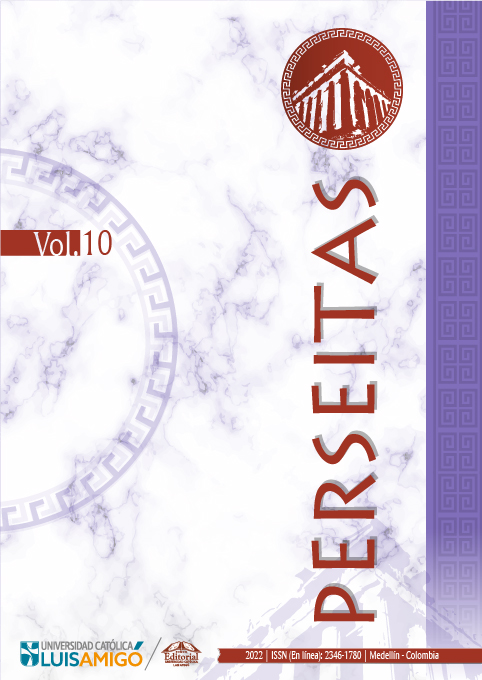Justicia social: concepto y acercamiento a pasajes de los profetas del siglo VIII a.C.
DOI:
https://doi.org/10.21501/23461780.4366Palabras clave:
Justicia Social, Antiguo Testamento, Hebreo Bíblico, Interpretación Bíblica, Profetas siglo VIII, ProfetismoResumen
La justicia social es un tema vigente, sobre todo en los países latinoamericanos en donde las injusticias hacen parte de la cotidianeidad. Para el cristianismo, el texto bíblico habla a todas las esferas de la vida y para la Justicia Social tiene bastante que decir. En este artículo se estudia el concepto de Justicia Social desde los profetas del siglo VIII a.C., teniendo en cuenta las palabras hebreas de base, así como una exploración a textos escogidos de aquellos profetas. La conclusión anima a que el cristianismo esté cada vez más comprometido con esta temática.
Descargas
Referencias
Allen, L. C. (1976). The Books of Joel, Obadiah, Jonah, and Micah. Eerdmans.
Allen, S. D. (2020). Why Social Justice Is Not Biblical Justice: An Urgent Appeal to Fellow Christians in a Time of Social Crisis. Credo House Publishers.
Alter, R. (2015). Hebrew Bible: A Translation with Commentary. W. W. Norton and Company.
Andersen, F. I., & Freedman, D. N. (2006). Micah. Doubleday. Libronix.
Blenkinsopp, J. (2000). Isaiah 1-39. Doubleday. Libronix.
Bobbio, N., & Bovero, M. (1997). Sociedad y estado en la filosofía política moderna: El modelo iusnaturalista y el modelo hegeliano-marxiano. Fondo de Cultura Económica.
Bovati, P. (1994). Legal Terms, Concepts and Procedures in the Hebrew Bible. Sheffield Academic Press.
Capeheart, L., & Milovanovic, D. (2007). Social Justice: Theories, Issues, and Movements. Rutgers University Press.
Dooyeweerd, H. (1998). Las Raíces de la Cultura Occidental. Clié.
Dyer, J. (2011). About Best Commentaries.com. https://www.bestcommentaries.com/about/
Enns, P. (2009). משְִׁפּטָ En M. Silva (ed.), New international dictionary of Old Testament theology & exegesis (Vol. 2) (pp. 1142-1144). Zondervan.
Gottwald, N. K. (1987). The Hebrew Bible: a Socio-Literary Introduction. Fortress Press.
Harper, W. R. (1905). A Critical and Exegetical Commentary on Amos and Hosea. T. & T. Clark.
Hayes, C. (2017). What’s Divine about Divine Law?: Early Perspectives. Princeton University Press.
Hayes, J. (1999). Dictionary of Biblical Interpretation. Abingdon Press.
Houston, W. J. (2008). Contending for Justice: Ideologies and Theologies of Social Justice in the Old Testament. T. & T. Clark.
Houston, W. J. (2020). Justice for the Poor?: Social Justice in the Old Testament in Concept and Practice. Wipf & Stock Publishers.
Irani, K. D., & Silver, M. (1995). Social Justice in the Ancient World. Greenwood Press.
Johnson, B. (1998). משְִׁפּטָ mišpāṭ; שֶפׁטֶ šep̄ēṭ; שֽׁפוֹת šep̄ôṭ. En J. Botterweck, E. Ringgren, & H.-J. Fabry (Eds.), Theological Dictionary of the Old Testament Vol. 9, (pp. 86-98). Eerdmans.
Johnson, B. (2003). צדַָק ṣāḏaq; צדֶֶק ṣeḏeq; צדְָקהָ ṣeḏāqâh; צַדִּיק ṣaddîq. En J. Botterweck, E. Ringgren, & H.-J. Fabry (Eds.), Theological Dictionary of the Old Testament Vol. 12 (pp. 239-264). Eerdmans.
Macintosh, A. A. (1997). Hosea: a critical and exegetical commentary. T. & T. Clark.
Mafico, T. (1992). Just, Justice. En G. A. Herion, A. B. Beck, & D. N. Freedman, The Anchor Bible Dictionary (Vol. 3), (pp. 1127-1129). Doubleday.
Marti, K. (1904). Das Dodekapropheton; erklärt. Verlag von Mohr. http://archive. org/details/dasdodekaprophet00mart
Motyer, J. A. (1993). The Prophecy of Isaiah: An Introduction Commentary. IVP Academic.
Nissinen, M. (2018). Ancient Prophecy: Near Eastern, Biblical, and Greek Perspectives (1st edition). Oxford University Press.
Oswalt, J. N. (1986). The Book of Isaiah, Chapters 1–39. Eerdmans.
Quell, G. (1965). Δίκη, δίκαιος, δικαιοσύνη, δικαιόω, δικαίωμα, δικαίωσις, δικαιοκρισία. En J. Botterweck, E. Ringgren, & H.-J. Fabry (Eds.), Theological Dictionary of the New Testament (Vol. 2) (pp. 173-214).Eerdmans.
Rad, G. V. (1973). Genesis: A Commentary. Westminster Press.
Sicre Díaz, J. L. (1984). Con los pobres de la Tierra: la justicia social en los profetas de Israel. Cristiandad.
Sicre Díaz, J. L. (2012). Introducción al Profetismo Bíblico. Verbo Divino.
Schaeffer, F. (2005). How Should We Then Live? The Rise and Decline of Western Thought and Culture (29th edition). Crossway Books.
Smith, R. L. (1984). Micah-Malachi. (Word Biblical Commentary, Vol. 32). Thomas Nelson.
Stuart, D. (1987). Word Biblical Commentary Vol. 31, Hosea-Jonah. Thomas Nelson.
Sweeney, M. A. (1996). Isaiah 1-39: With an Introduction to Prophetic Literature. Eerdmans.
Van Reken, C. (1999). The Church's Role in Social Justice. Calvin Theological Journal, 34(1), 198-202. https://www.calvin.edu/library/ database/crcpi/fulltext/ctj/68491.pdf
Vanhoozer, K. J., & Blomberg, C. L. (2009). Is There a Meaning in This Text?: The Bible, the Reader, and the Morality of Literary Knowledge. Zondervan.
Weinfeld, M. (1995). Social Justice in Ancient Israel and in the Ancient Near East. Magnes Press.
Wolff, H. W. (1974). Hosea: A Commentary on the Book of the Prophet Hosea. Fortress Press.
Wolff, H. W., Jr. McBride, S. D., & Janzen, W. (1977). Joel and Amos: A Commentary on the Books of the Prophets Joel and Amos. Fortress Press.
Publicado
Cómo citar
Número
Sección
Licencia

Esta obra está bajo una licencia internacional Creative Commons Atribución-NoComercial-SinDerivadas 4.0.
La revista y los textos individuales que en esta se divulgan están protegidos por las leyes de copyright y por los términos y condiciones de la Licencia Creative Commons Atribución-No Comercial-Sin Derivar 4.0 Internacional.

















